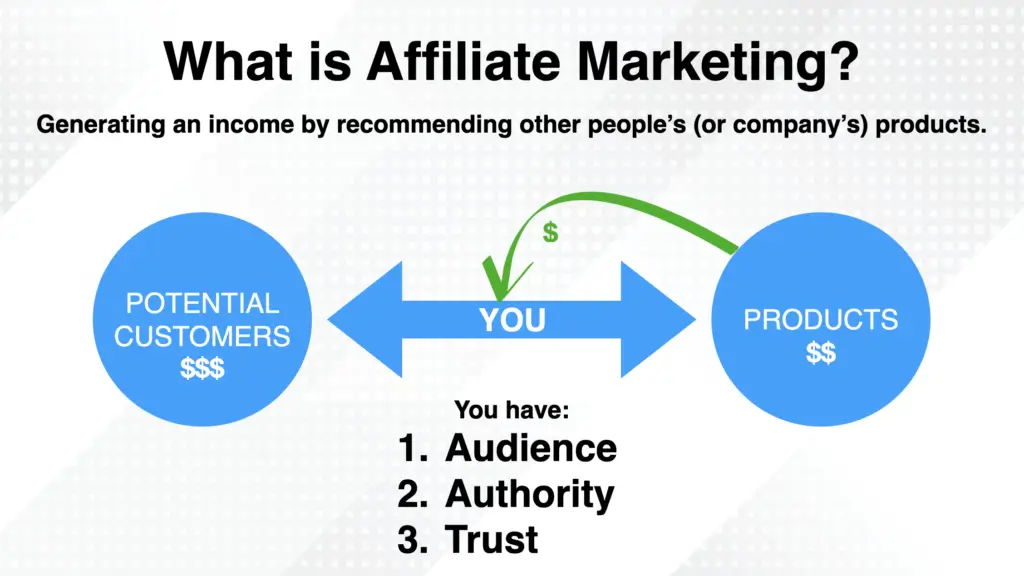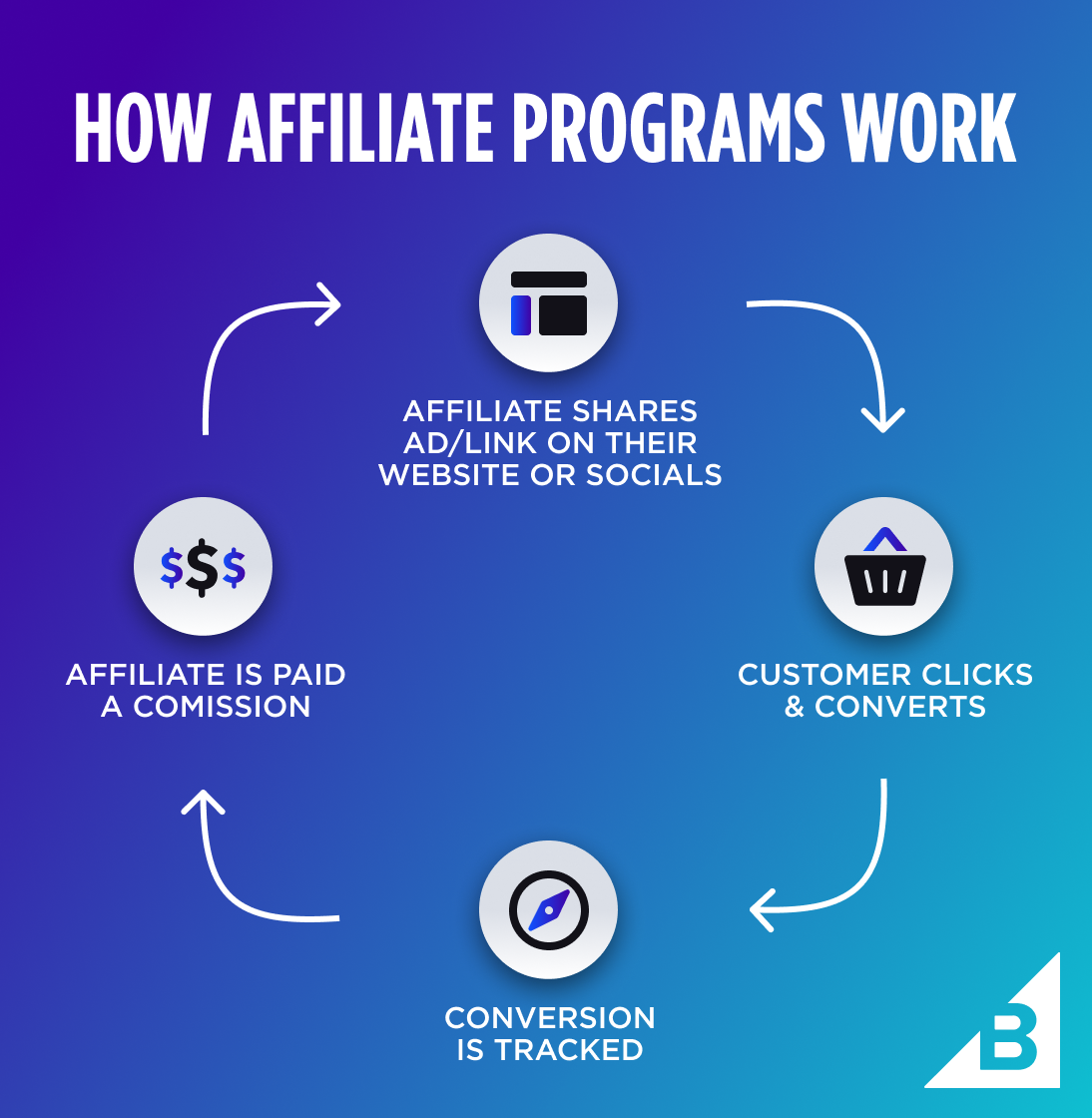Are Affiliate Marketing Programs Worth Your Time? Find Out!
Affiliate marketing is a performance-based strategy where affiliates earn commission for promoting products. It is a popular online marketing tactic that benefits both businesses and affiliates.
In today’s digital landscape, affiliate marketing has become a powerful tool for driving sales and expanding brand reach. By leveraging the influence of affiliates, businesses can tap into new customer segments and increase their revenue streams. Affiliates, on the other hand, can monetize their online presence by promoting products they believe in.
This symbiotic relationship has led to the growth of affiliate marketing as a key component of many successful online marketing strategies. As the e-commerce industry continues to evolve, affiliate marketing is expected to play an even more significant role in driving sales and fostering brand partnerships.

Credit: www.smartpassiveincome.com
The Rise Of Affiliate Marketing
Affiliate marketing has experienced a significant rise in recent years, becoming a popular avenue for businesses and individuals to generate income. This marketing strategy has evolved to become a crucial component of many companies’ digital marketing efforts, offering a mutually beneficial relationship between brands and affiliates. In this section, we will explore the historical growth and current trends of affiliate marketing, shedding light on its increasing prominence in the digital landscape.
What Is Affiliate Marketing?
Affiliate marketing is a performance-based strategy where individuals, known as affiliates or partners, promote products or services on behalf of a company in exchange for a commission. This commission is typically earned when a referral makes a purchase through the affiliate’s unique link or code. It’s a cost-effective way for companies to expand their reach and increase sales, while affiliates can monetize their online presence by leveraging their audience and marketing skills.
Historical Growth And Current Trends
Affiliate marketing traces its roots back to the 1990s when it emerged as a solution for companies seeking to reach a wider audience through online channels. Over the years, it has evolved to encompass various forms of digital marketing, including content marketing, social media influence, and email campaigns. The industry has witnessed a shift towards niche-specific affiliates and the integration of advanced tracking technologies to measure performance accurately. As the digital ecosystem continues to evolve, affiliate marketing is poised to remain a pivotal player in the online marketing landscape.
How Affiliate Marketing Programs Work
Affiliate marketing programs involve partners promoting products for a commission based on sales generated through their unique tracking links. Advertisers provide affiliates with marketing materials to drive traffic and conversions, creating a win-win situation for both parties involved in the marketing process.
Affiliate marketing is an online marketing strategy that has been gaining popularity over the years. It involves promoting other people’s products and earning a commission for every sale made through your unique affiliate link. In this section, we will discuss the basics of affiliate marketing, the key players involved, and how affiliate marketing programs work.The Basics Of Affiliate Marketing
Affiliate marketing is a performance-based marketing strategy where an affiliate earns a commission for promoting a merchant’s products. Affiliates are individuals or companies who promote products through their website, blog, or social media platforms. The commission earned is usually a percentage of the sale made through the affiliate’s unique tracking link. Merchants, on the other hand, are businesses that offer products or services for sale. They partner with affiliates to help promote their products and increase their sales. The merchant provides the affiliate with promotional materials such as banners, links, and product information that they can use to promote their products.Key Players In Affiliate Marketing
There are three key players in affiliate marketing: the merchant, the affiliate, and the customer. The merchant is the business that offers the products or services for sale. The affiliate is the individual or company that promotes the merchant’s products. The customer is the person who purchases the merchant’s products through the affiliate’s unique tracking link. Affiliate marketing programs work by tracking the sales made through the affiliate’s unique tracking link. When a customer clicks on the affiliate’s link and makes a purchase, the sale is tracked, and the affiliate earns a commission. The commission earned is usually a percentage of the sale made. The tracking of sales is done through affiliate tracking software. The software tracks the affiliate’s link, the customer’s purchase, and the commission earned by the affiliate. The affiliate can track their sales and commission through a dashboard provided by the affiliate program. In conclusion, affiliate marketing is an effective online marketing strategy that benefits both merchants and affiliates. Merchants get to increase their sales, while affiliates get to earn a commission for promoting products. Understanding the basics of affiliate marketing and how affiliate marketing programs work is crucial for anyone looking to venture into affiliate marketing.Pros Of Joining Affiliate Programs
Affiliate marketing offers numerous advantages for individuals looking to earn income online. By joining affiliate programs, you can tap into the potential for passive income, benefit from low entry costs, and enjoy a flexible work schedule. Let’s dive deeper into these enticing pros.
Potential For Passive Income
Affiliate marketing presents the opportunity to generate passive income, meaning you can earn money even while you sleep. Once you set up your affiliate links and promote products or services, you can continue earning commissions on every sale or referral made through your unique links. This means that your earning potential is not limited to the number of hours you work. With the right strategies in place, you can build a passive income stream that grows over time.
Low Entry Costs
Unlike starting a traditional business, affiliate marketing comes with low entry costs. You don’t need to invest a significant amount of money in inventory, product development, or infrastructure. All you need is a computer, internet connection, and the willingness to learn and implement effective marketing strategies. This makes affiliate marketing an accessible option for individuals with limited funds or those who want to test the waters before committing to a full-scale business venture.
Moreover, most affiliate programs are free to join, allowing you to start promoting products and earning commissions without any upfront fees. This low-cost entry barrier opens up opportunities for anyone interested in generating income through affiliate marketing.

Credit: www.authorityhacker.com
Cons Of Affiliate Marketing
Affiliate marketing has gained popularity as a lucrative way to earn passive income. However, it is not without its drawbacks. In this section, we will explore some of the cons of affiliate marketing that you should be aware of before diving into this business model.
Market Saturation
One of the challenges faced by affiliate marketers is market saturation. With the increasing number of individuals and businesses joining the affiliate marketing bandwagon, competition has become fierce. As a result, it can be difficult to stand out in a crowded marketplace and attract the attention of potential customers.
Moreover, market saturation can lead to a decline in commission rates. As more affiliates promote the same products or services, merchants may reduce the commission percentage to maintain their profit margins. This can significantly impact your earnings as an affiliate marketer.
Dependency On Third Parties
A major downside of affiliate marketing is the reliance on third parties. As an affiliate, you are promoting products or services that are owned and controlled by others. This means that you have no control over the quality of the products, customer service, or fulfillment process.
For instance, if a customer experiences a problem with a product they purchased through your affiliate link, you may be held responsible, even though you have no direct involvement in the transaction. This dependency on third parties can expose you to potential issues that are beyond your control, ultimately affecting your reputation and credibility as an affiliate marketer.
Additionally, your success as an affiliate marketer is dependent on the policies and decisions made by the merchants you promote. They may change their commission structure, discontinue certain products, or even terminate their affiliate program altogether. This lack of control over the business decisions of others can have a significant impact on your earnings and overall success in affiliate marketing.
Evaluating The Worth Of Affiliate Programs
Affiliate marketing is a powerful strategy for monetizing your website or blog. Evaluating the worth of affiliate programs is essential to ensure that you invest your time and effort in the most profitable opportunities. When considering different affiliate programs, it’s important to carefully assess various factors that can impact your potential earnings.
Factors To Consider
Before diving into an affiliate program, it’s crucial to consider several key factors that can influence its worth. These include the product relevance to your audience, the commission structure, the reputation of the merchant, and the cookie duration. It’s also important to assess the level of competition in the niche and the quality of promotional materials provided by the merchant.
Calculating Potential Earnings
When evaluating affiliate programs, calculating the potential earnings is a vital step. Understanding the average commission rate, the conversion rate, and the average order value can help you estimate your potential income. Additionally, it’s essential to consider the volume of traffic your website generates and the click-through rate to determine the realistic earning potential of an affiliate program.

Credit: www.bigcommerce.com
Success Stories In Affiliate Marketing
Affiliate marketing can lead to remarkable success for individuals who understand the strategies and put in the effort. Let’s explore some real-life stories of triumph in the world of affiliate marketing.
Case Studies
Case studies offer valuable insights into how affiliates achieved success in their marketing endeavors.
Interviews With Successful Affiliates
Hearing directly from successful affiliates can provide inspiration and actionable tips for aspiring marketers.
Common Pitfalls And How To Avoid Them
Avoid common pitfalls in affiliate marketing by focusing on niche selection, building trust with your audience, and choosing quality products. By providing valuable content and being transparent about your partnerships, you can establish credibility and avoid the common mistakes many affiliate marketers face.
Choosing The Wrong Products
Avoid promoting irrelevant products to your audience. Ensure products align with your niche.
Neglecting Content Quality
Focus on creating valuable content for your audience. Engaging content drives conversions.
Getting Started With Affiliate Marketing
Affiliate marketing is a powerful way to earn passive income by promoting products or services through affiliate links. Here are some essential steps to help you get started successfully.
Selecting The Right Program
When starting with affiliate marketing, focus on choosing a program that aligns with your niche and interests. Research various affiliate programs to find one that offers high commissions and quality products.
Strategies For Success
Implement effective strategies to maximize your affiliate marketing efforts. Create quality content that provides value to your audience and optimizes your website for conversions.
Frequently Asked Questions
What Is Affiliate Marketing?
Affiliate Marketing is a performance-based marketing strategy in which an affiliate earns a commission for promoting a product or service of another company.
How Does Affiliate Marketing Work?
Affiliate Marketing works by promoting the products or services of another company through unique affiliate links. When a user clicks on the link and makes a purchase, the affiliate earns a commission.
What Are The Benefits Of Affiliate Marketing?
Affiliate Marketing offers several benefits such as low start-up costs, passive income, flexible work hours, and the ability to work from anywhere. It also allows for the opportunity to work with a variety of products and services.
Is Affiliate Marketing Legitimate?
Yes, Affiliate Marketing is a legitimate and popular way to earn money online. Many reputable companies offer affiliate programs, and there are numerous success stories of individuals earning a full-time income through Affiliate Marketing.
Conclusion
Affiliate marketing offers a lucrative opportunity for individuals and businesses to collaborate and generate income. With its low barriers to entry and potential for passive income, it’s a viable option for those looking to monetize their online presence. By leveraging effective strategies and staying updated on industry trends, affiliate marketing can be a profitable venture.